Case Law Details
Ineos Commercial Vs CIT (ITAT Kolkata)
ITAT Kolkata held that AO failed to examine the agreement as composite agreement and hence non-examination of AO with that angle has caused prejudice to the interest of Revenue and hence CIT rightly set aside the assessment order by exercising powers under section 263 of the Income Tax Act.
Facts- The assessee entered into an agreement with Brahmaputra Cracker and Polymer Limited (BCPL) on 18.03.2009, vide which licence for manufacture of linear polyethylene in Assam and its sale across the world. Under this agreement, the assessee granted licence and the necessary knowhow including design, procurement, construction and operation of plant in Assam for the patentee by innovene process for manufacture of linear polyethylene to BCPL. Thus the assessee was actively helped BCPL in setting up the production process including training of its manpower, providing expert as well as supervision and commissioning services. The assessee has received fees under different categories enumerated in the agreement.
The fees amounting to Rs.3,99,39,056/- was not offered for tax by the assessee. The ld. CIT while examining the scope of the contract including the nature of receipt under different heads formed an opinion that it is a composite contract and this fee under the head “supervisory services’ (i.e. item (e) above), cannot be segregated at the instance of assessee. In the opinion of ld. CIT, this aspect was not examined by the ld. Assessing Officer constructively either in the assessment order or during the assessment proceeding. Therefore, ld. CIT set aside the assessment order and directed the ld. Assessing officer to reframe the assessment order after examining this issue and hearing the assessee.
Conclusion- Held that the theory of conditions enumerated in Article 13 of the DTAA between UK and India is totally misplaced. The enquiry at this angle is to be made if it is determinable that services provided by the assessee are stand alone services and not dependent upon the agreement. It is an unnecessary argument raised by the assessee before the ld. Assessing Officer for absolving from tax liability and this effort was not examined by the ld. Assessing Officer elaborately and diligently. If agreement is being perused, then, it would give a meaning that it is a composite agreement and different category of receipts cannot be segregated from it. Therefore, this concept of applicability of Article 13 is not at all applicable in the present case. The facts to that effect are not available precisely. Non-examination of the ld. Assessing Officer with that angle has caused prejudice to the interest of the Revenue. The ld. CIT has rightly set aside this order by exercising powers under section 263.
FULL TEXT OF THE ORDER OF ITAT KOLKATA
The assessee is in appeal before the Tribunal against the order of ld. Commissioner of Income Tax (IT & TP), Kolkata dated 30th March, 2022 passed under section 263 of the Income Tax Act, 1961 in A.Y. 2017-18.
2. The assessee has raised seven grounds of appeal. However, its grievances revolve around a single issue, namely, ld. CIT has erred in taking cognizance under section 263 of the Income Tax Act and thereby setting aside the assessment order dated 18.12.2019 passed under section 143(3) with a direction that de novo assessment be made.
3. Brief facts of the case are that the assessee has filed its return of income on 31.10.2017 declaring total income of Rs.4,42,58,223/-. The case of the assessee was selected for scrutiny assessment and an assessment order was passed on 18.12.2019 under section 143(3). It is a very brief assessment order, therefore, we deem it appropriate to take note of the complete order, which reads as under:-
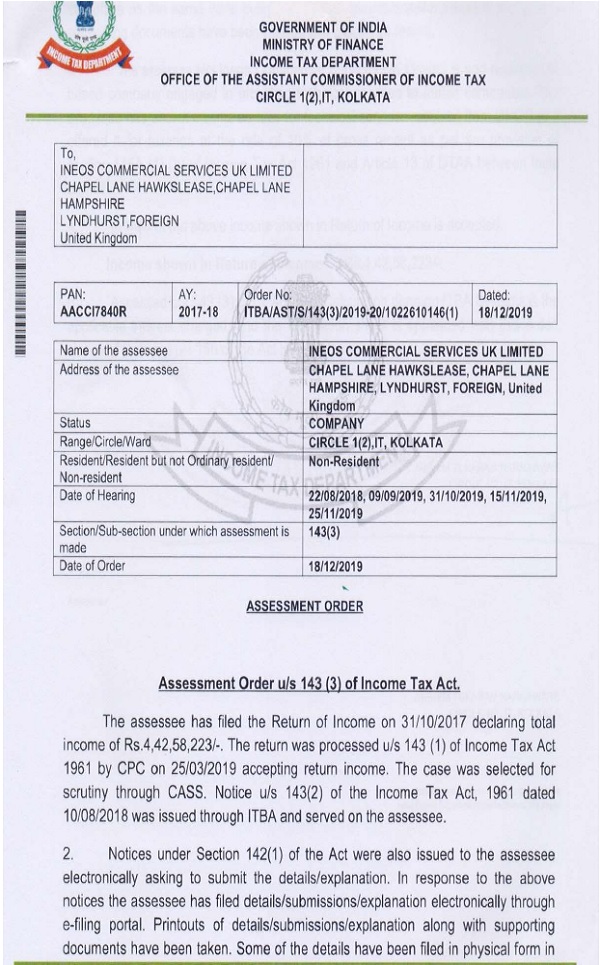
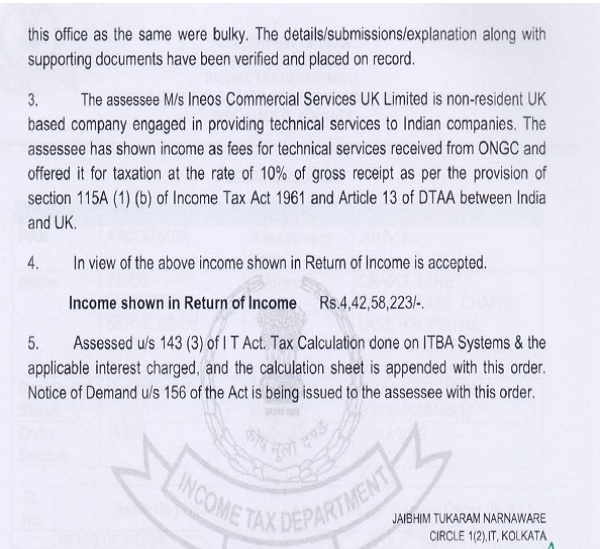
4. The ld. Commissioner perused the record and order of the ld. Assessing Officer, thereafter formed an opinion that the assessment order is erroneous as much as it caused a prejudice to the interest of the revenue. Hence, it required revision by exercising the powers under section 263. Accordingly ld. Commissioner has issued a notice dated 11.01.2022, copy of this notice has been placed on page no. 271 of the paper book. It reads as under:-
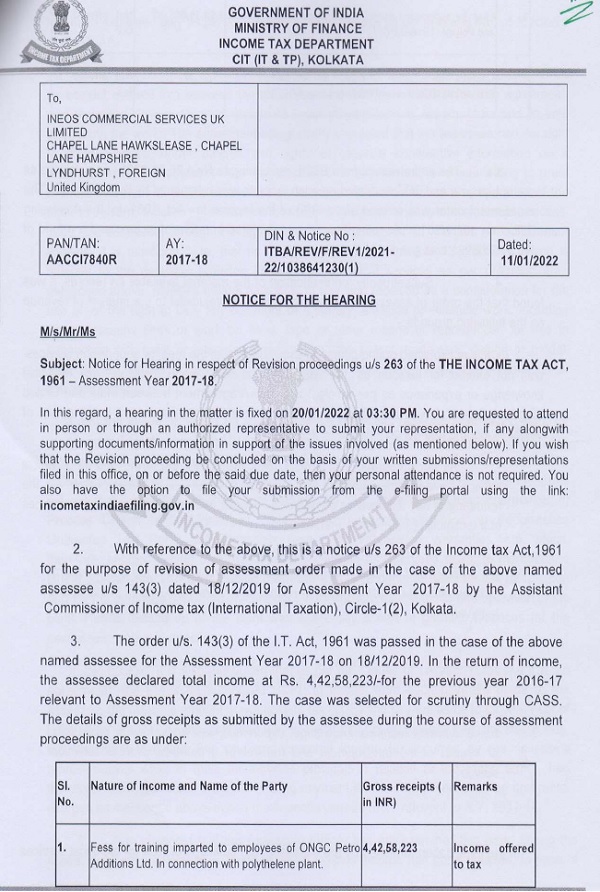
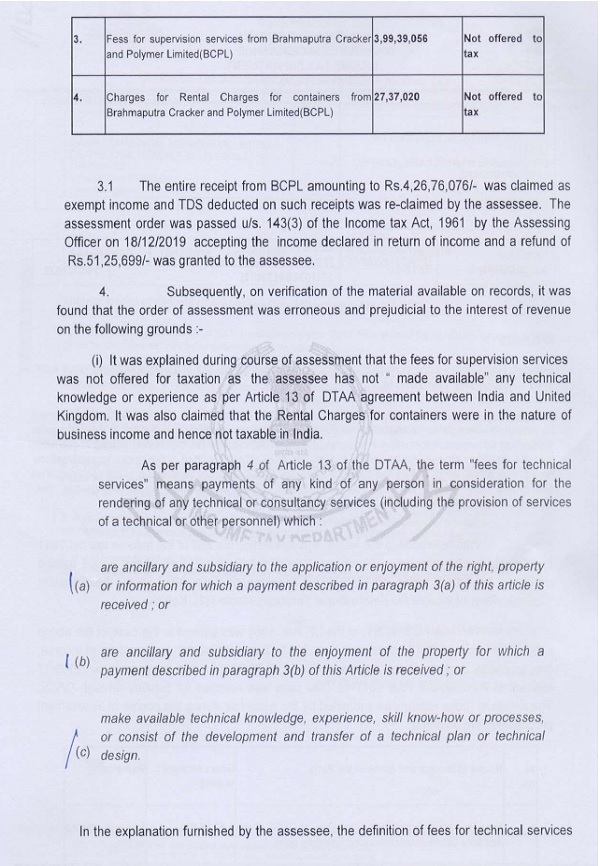
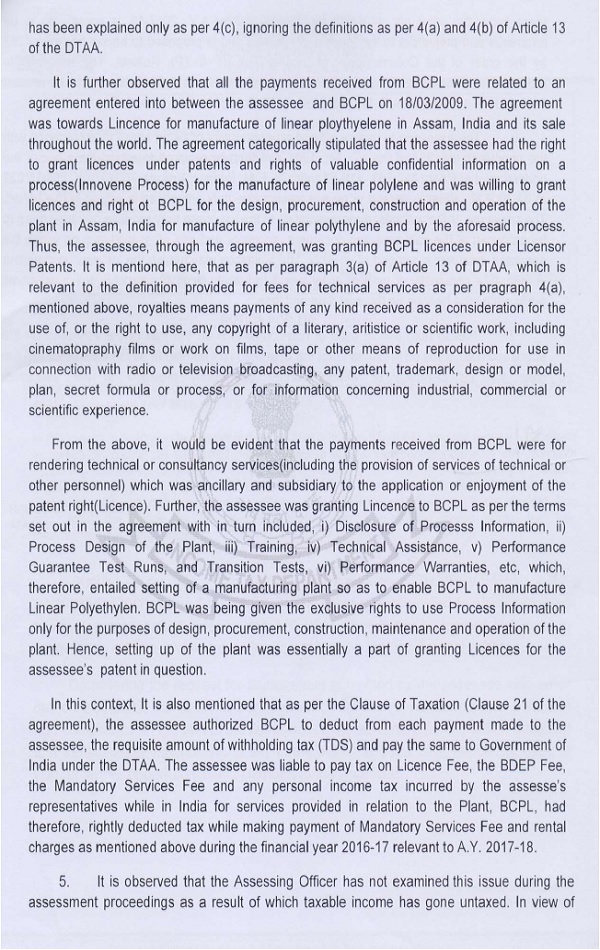
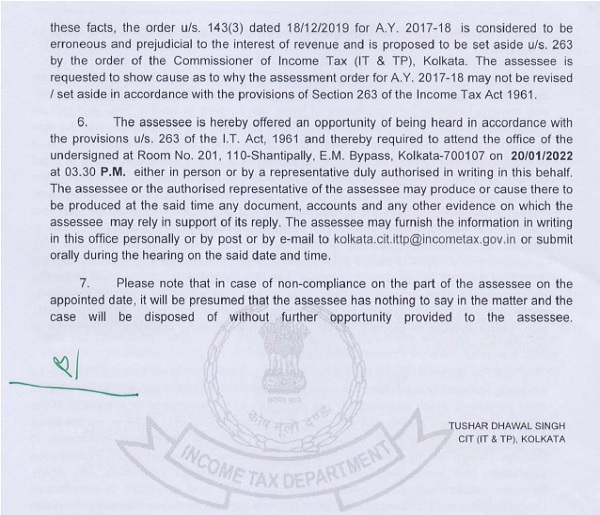
5. The assessee filed written submission, which has been reproduced by the ld. CIT and thereafter ld. CIT passed the impugned order on 30.03.2022.
6. Brief facts giving rise to this proceeding are that the assessee entered into an agreement with Brahmaputra Cracker and Polymer Limited (BCPL) on 18.03.2009, vide which licence for manufacture of linear polyethylene in Assam and its sale across the world. Under this agreement, the assessee granted licence and the necessary knowhow including design, procurement, construction and operation of plant in Assam for the patentee by innovene process for manufacture of linear polyethylene to BCPL. Thus the assessee was actively helped BCPL in setting up the production process including training of its manpower, providing expert as well as supervision and commissioning services. The assessee has received fees under different categories enumerated in the agreement. Copy of the agreement is available on pages no. 23 to 208 of the paper book. It has categorised the fees under following heads:-
(a) “licence fee and payments” (Article 3 of the Agreement 3.1 to 3.1.6). The assessee has offered tax on receipt of this fee.
(b) BDEP Fees – Article 3.2 of the Agreement- the assessee has paid tax on receipt of this fee also.
(c) Training Fees- Article 3.3- it had paid tax on this receipt also.
(d) Mandatory Service Fees- Article 3.4- it has paid tax on the receipt of these fees.
(e) Technical Assistance Fees- Article 7 of the Agreement. (It did not include this receipt in taxable income.)
7. The fees amounting to Rs.3,99,39,056/- was not offered for tax by the assessee. The ld. CIT while examining the scope of the contract including the nature of receipt under different heads formed an opinion that it is a composite contract and this fee under the head “supervisory services’ (i.e. item (e) above), cannot be segregated at the instance of assessee. In the opinion of ld. CIT, this aspect was not examined by the ld. Assessing Officer constructively either in the assessment order or during the assessment proceeding. Therefore, ld. CIT set aside the assessment order and directed the ld. Assessing officer to reframe the assessment order after examining this issue and hearing the assessee.
8. While impugning the order of ld. CIT, ld. Counsel for the assessee has raised two-fold submissions. In his first-fold of submission, he submitted that it is incorrect to suggest that ld. Assessing Officer has not examined this issue. The ld. Assessing Officer has gone through all the details and thereafter did not tax it. Therefore, it is to be construed that he has examined it but deem it fit to accept this stand of the assessee. For buttressing this fold of contention, he took us through the pages no. 1 to 3, wherein show-cause notice issued under section 142(1) of the Income Tax Act dated 24.10.2019 is placed on record. In response to this show-cause notice, the assessee has filed submission dated 15.11.2019 and the copy of this submission is placed on pages no. 4 to 8 of the paper book. He further submitted that the ld. Assessing Officer has again issued notices under section 142(1) on 19.11.2019 and 02.12.2019. These two notices were also replied by the assessee. The stand of the assessee was that the receipt was in the nature of supervisory services under this head. The assessee has not made available the technical knowledge, experience, skill, knowhow or processes. Therefore, under Article 13 of India-UK Treaty, the fees received for providing such services, where technology was not made available that would not fall within the concept of FTS, i.e. fees for Technical Services. The assessee has filed a note, which is available on pages no. 5 to 7 of the paper book. It relied upon the judgment of ITAT, Mumbai in the case of Raymond Limited –vs.- DCIT (86 ITD 791) and the decision of the Hon’ble Karnataka High Court in the case of CIT –vs.- De Beers India Minerals (P) Limited (2012) 21 taxmann.com 214. Though the ld. Assessing Officer has not made any discussion in the assessment order but it is to be construed that he must have applied his mind on this submission and only thereafter chose not to tax these receipts. He further contended that when ld. Assessing Officer has taken one of the plausible views on a debatable point, then, his order cannot be termed as erroneous and no action under section 263 deserves to be taken against the ld. Assessing Officer. In support of his contention, he placed on record a large number of decisions contained in the paper book running into 456 pages. In all, assessee has placed on record copies of 33 decisions.
8.1. In his next fold of submission, he submitted that whether the alleged supervision service fees is to be taxed as FTS or not, will depend upon the nature of technical services provided by the assessee and construction of facts along with interpretation of Article 13 of India-UK Treaty may lead to divergent opinion at the end of the authorities, but the view taken by the ld. Assessing Officer cannot be termed as erroneous view and, therefore, no action under section 263 deserves to be taken.
9. The ld. CIT(DR), on the other hand, put reliance upon the order of ld. CIT and submitted that the ld. CIT has examined this aspect in detailed in the impugned order and thereafter formed an opinion that it is a composite contract, which cannot be segregated in parts and, therefore, rightly found the assessment order as erroneous.
10. We have duly considered the rival contentions and gone through the record carefully. Before we embark upon an enquiry on the facts and issues agitated before us to find out whether the action u/s 263 of the Act, deserves to be taken against the assessee or not, it is pertinent to take note of this section. It reads as under:-
“263(1) The Commissioner may call for and examine the record of any proceeding under this Act, and if he considers that any order passed therein by the Assessing Officer is erroneous in so far as it is prejudicial to the interest of the revenue, he may, after giving the assessee an opportunity of being heard and after making or causing to be made such inquiry as he deems necessary, pass such order thereon as the circumstances of the case justify, including an order enhancing or modifying the assessment, or cancelling the assessment and directing a fresh assessment.
[Explanation.- For the removal of doubts, it is hereby declared that, for the purposes of this sub-section,-
(a) an order passed on or before or after the 1st day of June, 1988 by the Assessing Officer shall include-
(i) an order of assessment made by the Assistant Commissioner or Deputy Commissioner or the Income Tax Officer on the basis of the directions issued by the Joint Commissioner under section 144A;
(ii) an order made by the Joint Commissioner in exercise of the powers or in the performance of the functions of an Assessing Officer conferred on, or assigned to, him under the orders or directions issued by the Board or by the Chief Commissioner or Director General or Commissioner authorized by the Board in this behalf under section 120;
(b) “record shall include and shall be deemed always to have included all records relating to any proceeding under this Act available at the time of examination by the Commissioner;
(c) where any order referred to in this sub-section and passed by the Assessing Officer had been the subject matter of any appeal filed on or before or after the 1st day of June, 1988, the powers of the Commissioner under this sub-section shall extend and shall be deemed always to have extended to such matters as had not been considered and decided in such appeal.
(2) No order shall be made under sub-section (1) after the expiry of two years from the end of the financial year in which the order sought to be revised was passed.
(3) Notwithstanding anything contained in sub-section (2), an order in revision under this section may be passed at any time in the case of an order which has been passed in consequence of, or to give effect to, any finding or direction contained in an order of the Appellate Tribunal, National Tax Tribunal, the High Court or the Supreme Court.
Explanation.- In computing the period of limitation for the purposes of sub-section (2), the time taken in giving an opportunity to the assessee to be reheard under the proviso to section 129 and any period during which any proceeding under this section is stayed by an order or injunction of any court shall be excluded.”
11. A bare perusal of the sub section-1 would reveal that powers of revision granted by section 263 to the learned Commissioner have four compartments. In the first place, the learned Commissioner may call for and examine the records of any proceedings under this Act. For calling of the record and examination, the learned Commissioner was not required to show any reason. It is a part of his administrative control to call for the records and examine them. The second feature would come when he will judge an order passed by an Assessing Officer on culmination of any proceedings or during the pendency of those proceedings. On an analysis of the record and of the order passed by the Assessing Officer, he formed an opinion that such an order is erroneous in so far as it is prejudicial to the interests of the Revenue. By this stage the learned Commissioner was not required the assistance of the assessee. Thereafter the third stage would come. The learned Commissioner would issue a show-cause notice pointing out the reasons for the formation of his belief that action u/s 263 is required on a particular order of the Assessing Officer. At this stage the opportunity to the assessee would be given. The learned Commissioner has to conduct an inquiry as he may deem fit. After hearing the assessee, he will pass the order. This is the 4th compartment of this section. The learned Commissioner may annul the order of the Assessing Officer. He may enhance the assessed income by modifying the order. He may set aside the order and direct the Assessing Officer to pass a fresh order. At this stage, before considering the multi-fold contentions of the ld. Representatives, we deem it pertinent to take note of the fundamental tests propounded in various judgments relevant for judging the action of the CIT taken u/s 263. The ITAT in the case of Mrs. Khatiza S. Oomerbhoy Vs. ITO, Mumbai, 101 TTJ 1095, analyzed in detail various authoritative pronouncements including the decision of Hon’ble Supreme Court in the case of Malabar Industries 243 ITR 83 and has propounded the following broader principle to judge the action of CIT taken under section 263.
(i) The CIT must record satisfaction that the order of the AO is erroneous and prejudicial to the interest of the Revenue. Both the conditions must be fulfilled.
(ii) 263 cannot be invoked to correct each and every type of mistake or error committed by the AO and it was only when an order is erroneous that the section will be attracted.
(iii) An incorrect assumption of facts or an incorrect application of law will suffice the requirement of order being erroneous.
(iv) If the order is passed without application of mind, such order will fall under the category of erroneous order.
(v) Every loss of revenue cannot be treated as prejudicial to the interests of the Revenue and if the AO has adopted one of the courses permissible under law or where two views are possible and the AO has taken one view with which the CIT does not agree. If cannot be treated as an erroneous order, unless the view taken by the AO is unsustainable under law.
(vi) If while making the assessment, the AO examines the accounts, makes enquiries, applies his mind to the facts and circumstances of the case and determine the income, the CIT, while exercising his power under s 263 is not permitted to substitute his estimate of income in place of the income estimated by the AO.
(vii) The AO exercises quasi-judicial power vested in him and if he exercises such power in accordance with law and arrive at a conclusion, such conclusion cannot be termed to be erroneous simply because the CIT does not fee stratified with the conclusion.
(viii) The CIT, before exercising his jurisdiction under s. 263 must have material on record to arrive at a satisfaction.
(ix) If the AO has made enquiries during the course of assessment proceedings on the relevant issues and the assessee has given detailed explanation by a letter in writing and the AO allows the claim on being satisfied with the explanation of the assessee, the decision of the AO cannot be held to be erroneous simply because in his order he does not make an elaborate discussion in that regard.
12. In the light of above, let us analyse the facts and circumstances of the case. The assessee has been contending that it has received fees towards supervisory charges and since it has not made available technical knowledge about providing of these supervisory charges, therefore, under Article 13 of India-UK Treaty, this receipt will not fall in the ambit of FTS and not taxable. On an analysis of the record, we are of the opinion that the first step at our end is to find out these services for which it has charged this receipt. Under Article 7 of the Agreement, the assessee has listed the Technical Assistance Services for which it has been charging the fees. These conditions are running into four pages. The relevant part reads as under:-
“7. TECHNICAL ASSISTANCE
In this Agreement, “Mandatory Services” shall mean:
(i) review of Licensee’s documents referred to in Clause 7.1;
(ii) attendance at equipment vendors’ premises in accordance with Clause 7.2.1;
(iii) mechanical installation check and pre-commissioning safety audit of the Plant referred to in Clause 7.2.2.1;
(iv) assistance with pre-commissioning and commissioning of the Plant referred to in Clause 7.2.2.2;
(iv) attendance at and assistance with carrying out PGTRs and transition Tests at the Plant in accordance with Clause 7.2.2.3 and Clause 8.
7.1. In consideration of the fee paid by Licensee under Clause 3.4.1, the Licensor shall provide to Licensee the following Mandatory Services:
7.1.1. Licensee shall provide to Licensor five (5) copies and one (1) editable electronic copy in English of each document listed in the Eighth Schedule and Licensor shall, at no additional cost to Licensee, promptly review Licensee’s documents for compliance with the BDEP, return comments (if any) to Licensee within fifteen (15) working days of receipt of such “documents by Licensor. Notwithstanding this review, Licensee shall remain exclusively responsible for the design of the Plant and for ensuring that the design conforms to the BDEP;
7.1.2. Upon dispatch by the Licensor of its written comments on the Licensee P&ID’s as defined in the Eighth Schedule (Licensee’s “issued for construction” P&IDs) the Parties shall meet within thirty (30) days at a location and time to be agreed for the purpose of assisting Licensee in the interpreting and understanding Licensor’s comments on Licensee’s “issued for construction” P&IDs;
7.1.3 Licensee shall notify Licensor that the critical piping model is ready for review. Within thirty (30) days thereafter, the Parties shall meet at a location and time to be mutually agreed to review the critical piping model. Within twenty-eight (28) days, Licensor shall provide its written recommendations (if any) concerning the critical piping model.
The documents referred to in this Clause 7.1 shall constitute the detailed engineering documents essential for Licensor to fulfill the warranty referred to at Clause 10.1. The meetings referred to in this Clause 7.1 may take place as a single meeting if agreed by the Parties.
7.2. In consideration of the fee paid by the Licensee under Clause 3.4.2, Licensor shall provide the following Mandatory Services to Licensee:
7.2.1. for attendance at the equipment vendors’ premises to witness testing and inspection of the equipment essential to fulfill the warranty referred to at Clause 10.1 listed in the Eighth Schedule, subject to Licensee notifying Licensor no later than thirty (30) days in advance that such equipment is ready for testing and inspection;
7.2.2. advice and assistance to Licensee at the Plant essential for Licensor to fulfil the warranty referred to at Clause 10.1 including:
7.2.2.1. checking that the mechanical installation of the Plant is in accordance with the BDEP and conducting the pre-commissioning safety audit;
7.2.2.2 pre-commissioning and commissioning;
7.2.2.3. the carrying out of the PGTRs and Transition Tests.
7.3. Licensor shall observe and abide by all safety regulations notified by Licensee during the course of performance of services at Licensee’s petrochemical complex at Lepetkata, district Dibrugarh, Assam, India (including the Plant).
7.4. Before commencement of commissioning Licensor and Licensee will each appoint a leader of their respective commissioning groups (Licensor/Licensee Representatives).x x x x x x x x x x x
13. A perusal of the above clauses of the Agreement would indicate that basically these fees were charged for review of licencee’s documents, attendance at the equipment vendors’ premises in accordance with clause 7.2 and so on. During the course of hearing, we put a question to the ld. Counsel for the assessee, whether this service is an independent service as a stand-alone. We also enquired how this service alone can be performed by the assessee without entering into this complete agreement. The reply of the ld. Counsel for the assessee was in negative. Therefore, these clauses if read into clauses starting from the Article 3, then, would reveal that it is a fee for one part from the composite contract and it cannot be segregated. This service was not being provided on a item which can be consider as stand alone item even without availability of this agreement.
14. As far as the first-fold of submission of the ld. Counsel for the assessee is concerned, that ld. Assessing Officer has perused the submission of the assessee particularly the note dated 15.11.2019 available on pages no. 4 to 7 of the paper book is concerned, we are of the view that the assessee had made a fatuous attempt to goad the adjudicating authority in a field, where facts are not available. The judgments of ITAT, Mumbai in the case of Raymond Limited as well as of Hon’ble Karnataka High Court in the case of De Beers India Minerals (P) Limited could only be relevant if the assessee has been providing this nature of services as a stand-alone and not dependent upon the other performance of this agreement. The theory of conditions enumerated in Article 13 of the DTAA between UK and India is totally misplaced. The enquiry at this angle is to be made if it is determinable that services provided by the assessee are stand alone services and not dependent upon the agreement. It is an unnecessary argument raised by the assessee before the ld. Assessing Officer for absolving from tax liability and this effort was not examined by the ld. Assessing Officer elaborately and diligently. If agreement is being perused, then, it would give a meaning that it is a composite agreement and different category of receipts cannot be segregated from it. Therefore, this concept of applicability of Article 13 is not at all applicable in the present case. The facts to that effect are not available precisely. Non-examination of the ld. Assessing Officer with that angle has caused prejudice to the interest of the Revenue. The ld. CIT has rightly set aside this order by exercising powers under section 263.
15. The observations made by us will not impair or injure the case of the Revenue and will not cause any prejudice to the defence/explanation of the assessee on merit. The observations made by us are for the purposes of bringing home our conclusion in support of the order of ld. CIT in this appeal. Therefore, the issue that has been relegated by the ld. CIT for fresh hearing to the ld. Assessing Officer is to be examined afresh on merit in accordance with law. In view of the above, we do not find any merit in this appeal, it is dismissed.
16. In the result, the appeal filed by the assessee is dismissed.
Order pronounced in the open Court on July 18, 2023.




